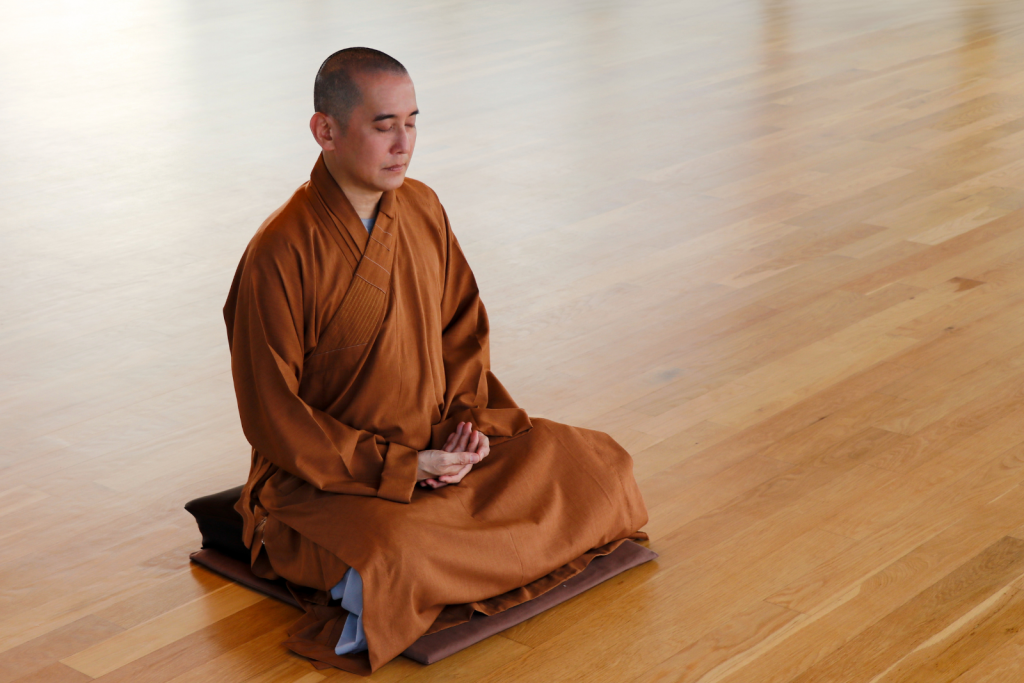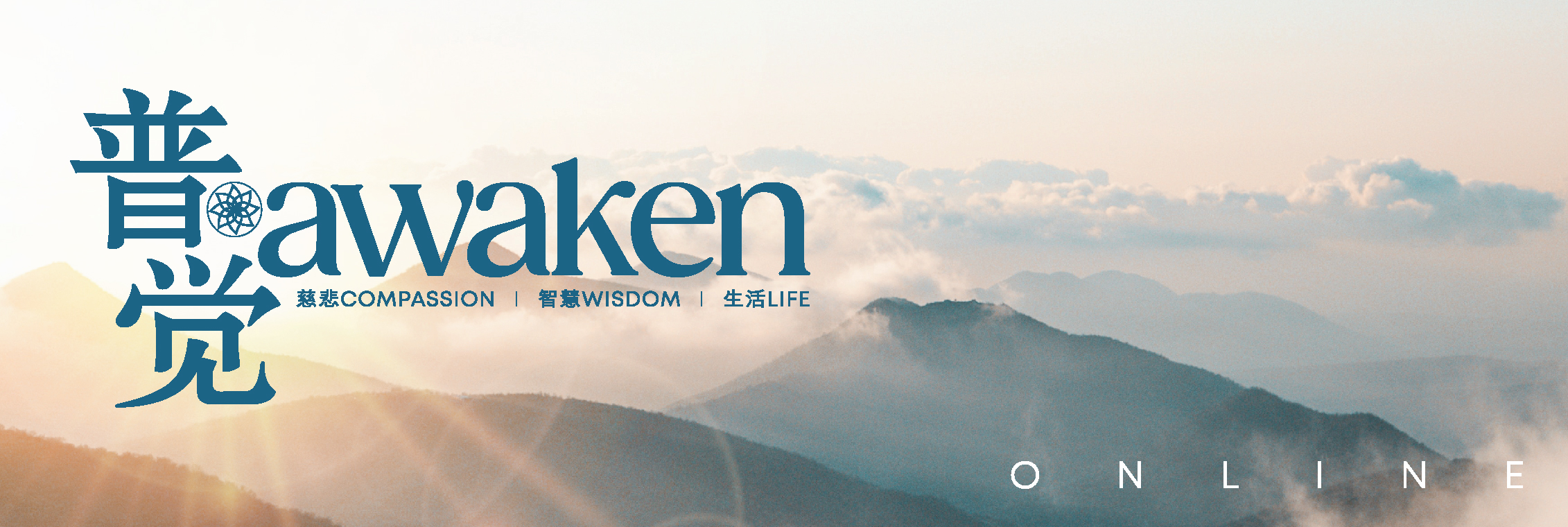The Call of the Quiet 安定的召唤

Venerable Chuan Jia’s Journey of Faith
Ordaining as a monk is more than a shift in lifestyle; it is a profound transformation motivated by spiritual calling, personal sacrifices and steadfast dedication. For those who hear the quiet inner whisper and feel the gentle pull of this path, it invites a life filled with clarity, peace and purpose.
Venerable Chuan Jia’s journey offers a glimpse into this sacred life, illuminating the challenges he faced, the growth he experienced, and the deep meaning he found through selfless service to the community.
Awakening the Path
Long before his ordination, Venerable Chuan Jia encountered the Buddha’s teachings —the Four Noble Truths, Dependent Origination and the Three Marks of Existence —illuminating profound truths within his life experiences. “These teachings revealed a deep understanding of life’s reality,” he reflects. Grasping the significance of Dependent Origination, impermanence and the importance of approaching life with compassion and wisdom, he felt inspired to explore the monastic path to navigate life’s challenges with purpose and clarity.
For Venerable Chuan Jia, ordination felt like a natural progression rather than a sudden leap. “Much of my lifestyle was already aligned with monastic practices and values,” he shares. Rising at 5 am, performing daily chants, attending Dharma talks and pujas, and volunteering in various capacities had all become integral to his routine. This strong foundation made his transition into monastic life smoother than he anticipated.
Mindfulness and meditation, in particular, became the cornerstone of his spiritual journey. “It calms my busy mind and often sparks new ideas, helping me resolve challenging situations and offering creative insights for ongoing projects,” he shares. This practice naturally guided him toward a life of service, where sharing the Buddha’s teachings and guiding others in mindfulness — through practices like repentance prostration, chanting the Buddha’s name, circumambulating the Buddha and meditation — became both a path to personal growth and a way to benefit others.
Embracing Sacrifices, Overcoming Challenges
Despite his readiness, the path to monkhood still demanded significant personal and social sacrifices. “My family, especially my mother, was initially shocked by my decision,” he recalls. However, understanding his deep passion for helping and serving others, his family gradually accepted his choice, ultimately giving him blessings to follow his heart’s call.
Surprisingly, the transition to monastic life unfolded more smoothly than he had expected. His consistent practices and mental preparation played a crucial role. “I adopted the mindset that ‘the Sangha is your family, befriend and care for everyone’ and that ‘the monastery’s duties come first; always go with the flow,'” he shares. This perspective brought deep meaning to his journey, allowing him to prioritise the needs of the monastery and the Sangha over his own.
A Balance Between Service and Personal Cultivation
While monastic life has its challenges, it also brings immeasurable rewards. “Pace yourself with mindfulness, centre yourself through meditation, and nourish your body and mind with ample rest and the wisdom of the Dharma,” Venerable Chuan Jia advises. “This way, we can balance and fulfil our monastic roles, serve the community, and continue our self-cultivation.” Mindfulness is the anchor of his daily actions, whether attending meetings, engaging in tasks, or guiding others, allowing him to bring calm focus and intention to each moment.
Each day brings an opportunity for Venerable Chuan Jia to share the Buddha’s wisdom, support others through life’s challenges, and engage in meaningful service. “Walking the Bodhisattva path reveals how much we still need to learn,” he notes, capturing the humility at the heart of his journey. Through acts of selfless service, monks deepen their understanding of the Dharma. “By helping others, we nurture our own growth,” he shares, underscoring the reciprocal nature of compassion and spiritual practice.
Community service is at the heart of his life’s purpose. “The late Venerable Thich Nhat Hanh described this relationship as ‘interbeing’ — by serving others, we are essentially serving ourselves, as we are all deeply interconnected,” he explains. The joy that arises from helping others fortifies his mind and strengthens his Bodhisattva vow, fostering resilience and purpose along his spiritual path.
Daily practices of chanting, meditation, mindfulness, and Dharma study anchor him in the Buddha’s teachings. “This connection humbles and inspires me, reminding me to diligently cultivate along the long and arduous path to Buddhahood,” he says. He channels these moments of reflection into opportunities for self-improvement, benefiting both the Sangha and the wider community.
The Contemporary Monk
Contrary to common misconceptions, today’s monks are not isolated. “I don’t feel lonely,” he laughs. “Honestly, I don’t have time to feel lonely.” Venerable Chuan Jia’s days are filled with monastic duties, community service and personal cultivation.
Far from being disconnected, today’s monks embrace technology to stay connected and better serve their communities. “Whether it’s answering inquiries via phone or email, propagating the Dharma on social media, or helping teenagers balance digital life with mindfulness, monastics blend ancient teachings with modern realities.”
Maintaining relationships with family and friends remains important, even after ordination. Venerable Chuan Jia explains that, in the Mahayana tradition, ordination does not mean completely severing ties. They are also sentient beings caught in the cycle of samsara, facing their own challenges and seeking ways and wisdom to free themselves from suffering. “By embodying the Buddha’s teachings and demonstrating our self-transformation, we inspire them on their journeys. When they open their hearts to us, we can offer guidance and support rooted in compassion and wisdom, helping them navigate life’s challenges and stresses.”
Advice for the Aspiring
Venerable Chuan Jia offers practical advice for those contemplating monkhood. “Every career has stresses and challenges, and monkhood is no exception,” he explains. The difference lies in how monastics approach them — with mindfulness, compassion and wisdom. Balancing personal cultivation with community service fosters harmony, where inner peace and outward service coexist.
He encourages potential aspirants to explore the monastic life firsthand. “Don’t quit your job just yet. Instead, take a few months’ leave and experience life as a Sangha. This immersion offers insight into monastic routines and helps clarify one’s calling.” For those who feel inspired or certain about this path, ordination arrangements can follow.
The Pursuit of Growth and Purpose
Monkhood is not an escape from the world; it is a deep engagement with life. Personal growth and service become intertwined, with fulfilment arising from mindful living, self-reflection and the joy of serving others.
“Enlightenment is a gradual process,” Venerable Chuan Jia shares. “As we deepen our understanding and learning, we help and guide others who cross our paths.” His journey is one of self-discovery, spiritual awakening and compassionate service — an invitation to all who feel the quiet call within.
For those who hear that call, our Sangha warmly encourages you to explore it further. Reach out to us at 6849 5357 or visit kmspks.org/monkhood for more information.
传嘉法师的信仰之路
出家为僧不仅仅是生活方式的改变,更是一种来自内心深处的召唤,承载了舍弃自我与坚定奉献的精神。对于那些聆听内心指引、或对出家之路有所向往的人而言,出家如同一份邀请函,引领着人们踏上一段澄明、安宁、充满意义的心灵之旅。
传嘉法师的修行之路,为我们揭示了出家生活的真实面貌,亦展示了他所经历的挑战、成长的体悟,以及在无私奉献中所发现的深远意义。
觉醒之道
早在决定出家以前,传嘉法师就已深受佛陀教义的启发——四圣谛、缘起法与三法印,照亮了他的生命。他说道:“这些教义让我透彻地洞见的生命实相。” 通过理解缘起与无常生灭的意义,他更明白以慈悲和智慧面对人生挑战的重要性。因此,他选择了踏上出家之路,以此在无常的世界中找到方向与意义。
对传嘉法师而言,出家并非仓促的决定,而是一条自然而然铺就的道路。他回忆道:“在出家之前,我的生活方式已逐渐趋向出家生活。”每日五点早起、诵经、参加法会与佛法课程,参与志工服务,已成为他生活的新常态。这些作息不仅为他的出家之路奠定了扎实的基础,也使他在加入僧团生活时比预想中更加顺利。
正念与禅修,尤其成为他心灵修行的重要支柱。他说道:“禅修不仅让我浮动的心逐渐安定,在面对挑战时也经常为我带来新的灵感和启发。”随着时间的推移,这些修持在不知不觉中引领他走向无私奉献之道,也让他将佛法的传播和禅修的教学视为自利利他的实践。
超越牺牲 · 跨越挑战
尽管已做足准备,出家依然需要他在个人与社会层面上作出相应的取舍。“这个决定让家人,尤其是母亲,感到震惊。”传嘉法师回忆起,出家不仅意味着离开家人,还需放下情感的牵挂。但在兄弟姐妹的理解和支持下,家人逐渐接受并祝福他所选择的这条道路。” 但随着时间的推移,家人理解了他对服务众生的热忱,最终接受并祝福了他的选择。
出人意料的是,出家后的转变并不像他所想的那样艰难。一直以来的修持与心态上的调整在这一过程中起到了至关重要的作用:“我抱持着‘僧团即是家’的态度,与众僧友善相处,并秉持‘寺院事务为重、随缘而行’的心态。” 这种心境使他将寺院和僧团的需求置于个人所求之上,赋予了出家生活更深的意义。
在服务与修行之间寻求平衡
僧侣生活虽有其挑战,但也带来了无数的法喜。“我们需要以正念自持,通过禅修平衡心境,并以佛法智慧滋养身心,确保足够的休息。”他指出,“唯有如此,才能在履行僧团职责、服务大众的同时,不断精进修行。”无论是参与会议、处理事务,或是引导信众,他都将正念融入日常中的每一个细节。
在传嘉法师的日常中,每天都充满了分享佛陀智慧、引导他人解除生活中的挑战、并参与有意义的服务机会。他说道:“行菩萨道让我深刻地意识到,我们需要不断精进学习。”通过无私的服务,僧侣不仅要帮助他人,更需不断深化自身的修行。“当我们帮助他人时,我们自身也在成长。”他也以此强调慈悲心与自我修行的关键。
传嘉法师强调,社区服务是他僧侣生活中不可或缺的一部分。他引用一行禅师的“互即”理念,解释道:“帮助他人亦是帮助自己,因为众生本为一体。”这种助人所带来的内心喜悦,不仅让人满足,更让他在菩萨道上愈发坚定。
每日的诵经、禅修、正念步行及佛法研习,让他始终与佛陀的智慧保持紧密联系。他说道:“这种联系使我谦逊且深受启发,提醒我在菩提道上不断精进。”在这些正念的片刻中,他将修持转化为利乐大众的动力。
现代僧侣的面貌
与世俗观念不同,现今的僧侣并非远离人群。他笑道:“我并不感到孤单,说实话,我甚至没有时间去感到孤单。”他的日常生活充满了寺务、修行与服务大众。
现代僧侣也运用科技来保持与外界的联系,以便更好地服务大众。“无论是通过电话或邮件回答咨询、在社交媒体上弘扬佛法,还是帮助青少年在数码生活中找到正念,僧侣们都在古老智慧与现代社会之间找到平衡。”
出家后,维系与家人朋友的联系依然重要。传嘉法师说道,大乘佛教并不提倡断绝亲情。他们也是生死轮回中的有情众生,同样面临着不同的挑战,亦寻求着离苦得乐的方法与智慧。“我们通过自身修行的榜样,启发他们走上修持之路。家人若向我们敞开心扉,我们便以佛法为根基,提供智慧与慈悲的指导。”
对未来出家众的建议
传嘉法师给有意出家的人提出了实际而深刻的建议:“每个职业都有其压力与挑战,出家亦不例外。”僧侣通过正念、慈悲与智慧去应对挑战,达致内心和谐,使个人修持与大众服务得以共存。
他鼓励那些有志者亲身体验僧团生活。他说道:“不必急于辞职,不妨请几个月的假期,亲身感受僧团的日常生活。”这样的体验有助于明确内心的召唤。若在体验后志向坚定,便可安排正式的出家事宜。
追寻成长与意义
出家并非逃避世间,而是一种更深入世间的方式。个人成长与服务他人相辅相成,法喜来自于正念生活、自省与助人的喜悦。
“觉醒是渐进的旅程。”传嘉法师说道。“随着我们对佛法的深入理解,我们也能引领并帮助他人。”他的修行之路,是自我探索、内心觉醒与慈悲奉献的旅程,亦是一份召唤,面向所有心中听到宁静之声的人。
若您也听到了这份心的召唤,我们诚挚欢迎您进一步探索出家之路。请致电6849 5357,或访问 kmspks.org/monkhood 了解更多信息。

